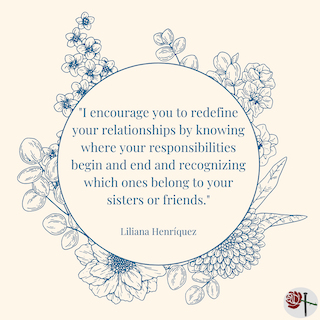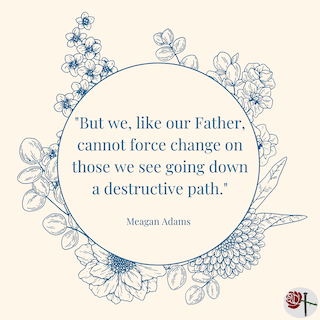Search Our Blog Posts
Blog Article Tags
We love building relationships. Subscribe to our blog to receive weekly encouragement in your email inbox.
- Details
 Written by Liliana Henríquez, volunteer with Iron Rose Sister Ministriesin Colombia
Written by Liliana Henríquez, volunteer with Iron Rose Sister Ministriesin Colombia
Where do you begin and where do I begin?
Why does it sometimes seem as if we become one person instead of being two separate individuals?
Have you ever wondered this?
Sometimes my tastes merge with your tastes and my problems become your problems.
However, it is important to know our boundaries and not assume responsibilities that are not ours to begin with.
When we understand that each of us has our own responsibilities to fulfill, we will stop seeing what happens in our neighbor's house and instead, focus on what happens in ours. It's about acknowledging what God gave us and doing the best you can with it. As we see in the parable of the talents in Matthew 25:14-30, the task was simple: each one would be in charge of multiplying the talents he received. The task was not to see how many talents the friend got and do the work for him. Each one of them had to fulfill their own responsibilities.
I have come to understand that, just like me, the people around me have internal and external resources to face the situations of daily life. Nobody needs to be carried like a baby. We, as adults, have the potential to use the resources available to us. In addition, we count on the extraordinary help of the Holy Spirit to guide us at all times and intercede for us before God when we do not even know what to ask for (Rom. 8:26).
Okay then, if I know that you are capable of taking care of yourself, why is it difficult for me not to get so involved in your life?
Because I am not sure what my boundaries are!
When this happens, out of a motivation to keep up appearances, we get involved in situations in which we have not been called, we give opinions that we have not been asked for, and we accept tasks that we do not really want to do.
I encourage you to redefine your relationships by knowing where your responsibilities begin and end and by recognizing which ones belong to your sisters or friends. If each of us guards our own heart and takes care of ourselves, we will have more pleasant and easy-going friendships. After all, no one likes to carry other people's problems! While we may be willing to help, we should always have the discipline to establish boundaries, so that we don’t allow those we love to grow dependent on us but rather allow them to gain strength and experience through their trials. By establishing our boundaries, we do not become involved in an unhealthy way.
It’s one thing to help and support each other. We have been called to love one another, but to assume other people's responsibilities is a very different thing.
It is time to clearly define the terms of our relationships and establish healthy boundaries.
- Details
 Written by Meagan Adams, volunteer with Iron Rose Sister Ministries in McRae, Arkansas
Written by Meagan Adams, volunteer with Iron Rose Sister Ministries in McRae, Arkansas
Some relationships are easy; some are hard. The pandemic exposed many conflicts that were seething under the surface. We’ve divided into “us” versus “them” camps on so many levels. Does anyone else feel that were experiencing another Babel, where we don’t even speak the same language? I felt the relationship challenges most keenly when our adult daughter moved home last fall. After being out of work for nearly a year due to the pandemic, her savings were depleted. We offered her our house to live in. “Not to worry,” said we, “we’re going back to Greece in a couple of weeks and you’ll have the house to yourself.” Virus variants developed, countries experienced new waves of cases, regulations and travel options continually changed. Somehow, a couple of weeks turned into three months.
It’s never easy when an adult child moves home. It’s especially challenging when that adult child has developed a world view vastly different from your own. Every conversation turned into a debate, and I found myself afraid to open my mouth because I felt like I didn’t even speak the same language. I spent a lot of time praying, asking for new ways to relate. I’m still waiting for an epiphany. Things improved, but the relationship challenge is still there – which is not necessarily a bad thing. You see, when our daughter lived away it became easy not to engage at all beyond the surface level. Living together, this was not possible. Even if it’s not easier, the relationship is better because something is actually going on.
I recently thought of a parable in which Jesus uses a family in conflict to relate a spiritual truth. Luke 15: 11-32 tells the story that we commonly call “The Prodigal Son.” Ultimately, it’s about God’s redemption of all people, even those that might be considered unworthy, but we can learn some lessons about family in the story as well. A man has two sons – the easy kid and the hard kid (I’m paraphrasing here). When the “hard kid” asks for his inheritance early, I’m sure the father knew he wasn’t really ready for it. He also knew his son well enough to realize that deterring him would be counterproductive. And so, he let him go. The danger was real; I’m sure we all know stories of prodigals who never returned.
But we, like our Father, cannot force change on those we see going down a destructive path. The change must come from within. We wait, we love, and we watch, as the father in the parable does. Luke’s story has a happy middle when the younger son returns home. Relationship is restored. But, alas, joy is cut short. The older son, the “easy kid,” is resentful. Will the older son get over it? Will his resentment continue to fester? The story ends with this issue still hanging. The father is back to the waiting game. He tells him, “Son, you are always with me, and all that is mine is yours,” (Luke 15:31, ESV) but he can’t force a change to the older son’s heart. All he can do is wait, and love, and watch for the opportunity to connect again.